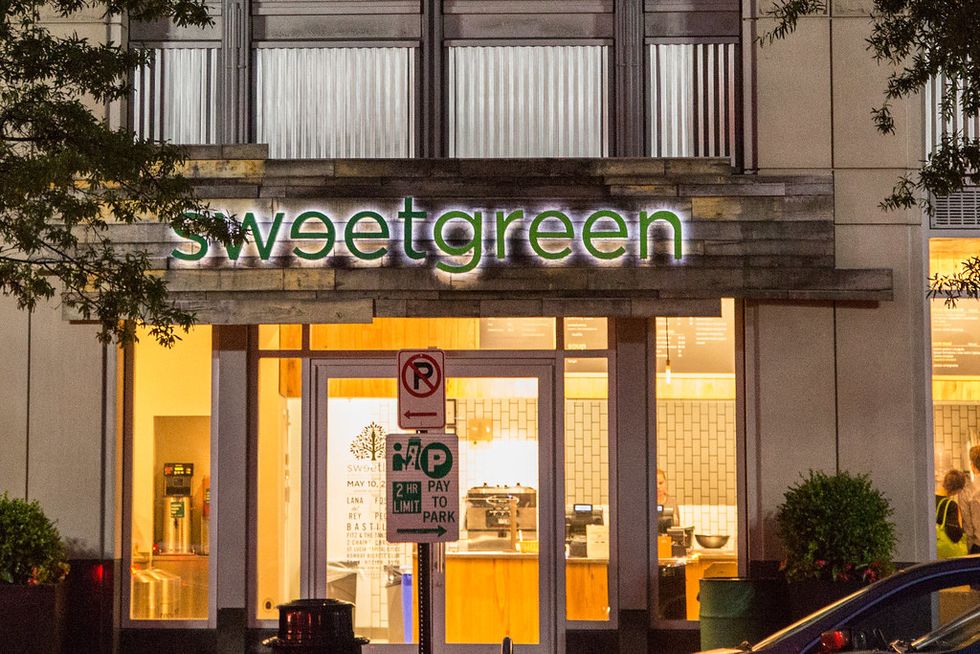LA Tech Updates: Sweetgreen to Go Carbon Neutral by 2027; Santa Monica Opens Zero-Emission Zone
Ben Bergman is the newsroom's senior finance reporter. Previously he was a senior business reporter and host at KPCC, a senior producer at Gimlet Media, a producer at NPR's Morning Edition, and produced two investigative documentaries for KCET. He has been a frequent on-air contributor to business coverage on NPR and Marketplace and has written for The New York Times and Columbia Journalism Review. Ben was a 2017-2018 Knight-Bagehot Fellow in Economic and Business Journalism at Columbia Business School. In his free time, he enjoys skiing, playing poker, and cheering on The Seattle Seahawks.

Sweetgreen has pledged to be carbon neutral in six years by cutting its carbon output in half. Santa Monica and the L.A. Cleantech Incubator launched the nation's first zero-emissions delivery zone, a project meant to encourage companies to embrace EV transportation. Sign up for our newsletter and follow dot.LA on Twitter for more updates.
Today:
- Sweet Green wants to get greener
- Santa Monica opens emission-free delivery zone in downtown
Sweetgreen Promises Carbon Neutrality by 2027
 LA Tech Updates: Sweetgreen to Go Carbon Neutral by 2027; Santa Monica Opens Zero-Emission Zone
LA Tech Updates: Sweetgreen to Go Carbon Neutral by 2027; Santa Monica Opens Zero-Emission ZoneSweetgreen wants to be greener.
The Culver City-based fast casual unicorn has pledged to be carbon neutral in six years by cutting its carbon output in half.
"We believe that climate change is the defining challenge of our generation, posing a real and systemic threat to the health of people and the planet," Sweetgreen's founders wrote in a blog post. "As restaurant leaders in an industry that drives 25% of global greenhouse gas emissions, it is our responsibility to use our platform and resources to confront this crisis head on."
The company says it started measuring its carbon output in 2019, which helped it identify areas where it could save energy. It was already well ahead of most other restaurants because of its heavy use of low impact fruits and vegetables rather than beef, but it wanted to do more.
Sweetgreen will now use carbon output as a metric for deciding what to put on its menu. It will also work with suppliers to be more environmentally friendly.
"To truly future proof our company, we must evolve our supply network and fix our relationship to the soil — and cultivate an environment that benefits the entire agricultural ecosystem: our food partners, customers, team members, and the planet," the founders wrote.
Santa Monica Opens Nation's First Zero-Emissions Delivery Zone

Ikea, Shopify and the yerba mate brand Guayaki are just a few of the companies that vow to cut pollution in Santa Monica by using electric vans and delivery robots to fulfill orders.
The seaside city and the L.A. Cleantech Incubator launched the nation's first zero-emissions delivery zone on Thursday, a project meant to encourage companies to embrace EV transportation by giving drivers access to 20 reserved parking and loading spots. The one-square mile radius will span Downtown Santa Monica and Main Street.
City officials will be watching for changes in traffic and pollution with an eye towards introducing permanent zones down the line.
To do that, they've hired Automotus, a venture-backed software startup that monitors curbside traffic. The company will install 20 small video cameras on street lamps lining the parking spots to collect data on factors like congestion and safety. Plus, the technology will alert drivers to open parking spots through an app.
Automotus' CEO says the cameras will not pick up personally identifiable information. In other cities, however, the software has been used to automate parking violations and issue tickets.
Santa Monica Mayor Sue Himmelrich said in a statement that the pilot comes at a "critical moment" in the city's recovery.
"Beyond reducing carbon and congestion, the added bonus is that restaurants can keep higher margins of sales on delivered food items," Himmelrich added.
To encourage use of the space, local businesses will be given access to two Nissan electric vans and ecommerce software company Shopify will equip merchants in the area with Kiwibot delivery robots to help drop off orders.
- EVgo Goes After $2.6B SPAC Deal, Shares Soar - dot.LA ›
- LA's Clean Tech Startups Tackle Climate Change - dot.LA ›
- EVgo Will Work with GM on Its Nationwide EV Charging Network - dot.LA ›
Ben Bergman is the newsroom's senior finance reporter. Previously he was a senior business reporter and host at KPCC, a senior producer at Gimlet Media, a producer at NPR's Morning Edition, and produced two investigative documentaries for KCET. He has been a frequent on-air contributor to business coverage on NPR and Marketplace and has written for The New York Times and Columbia Journalism Review. Ben was a 2017-2018 Knight-Bagehot Fellow in Economic and Business Journalism at Columbia Business School. In his free time, he enjoys skiing, playing poker, and cheering on The Seattle Seahawks.
Francesca Billington is a freelance reporter. Prior to that, she was a general assignment reporter for dot.LA and has also reported for KCRW, the Santa Monica Daily Press and local publications in New Jersey. She graduated from Princeton in 2019 with a degree in anthropology.




 Image Source: Skyryse
Image Source: Skyryse
 Image Source: Northwood Space
Image Source: Northwood Space